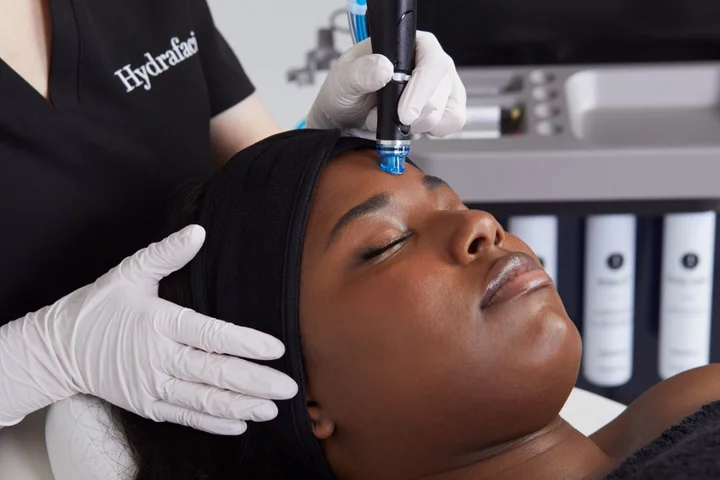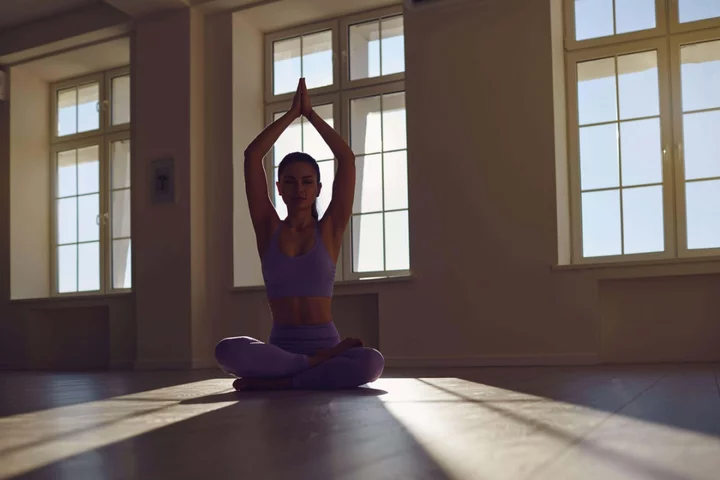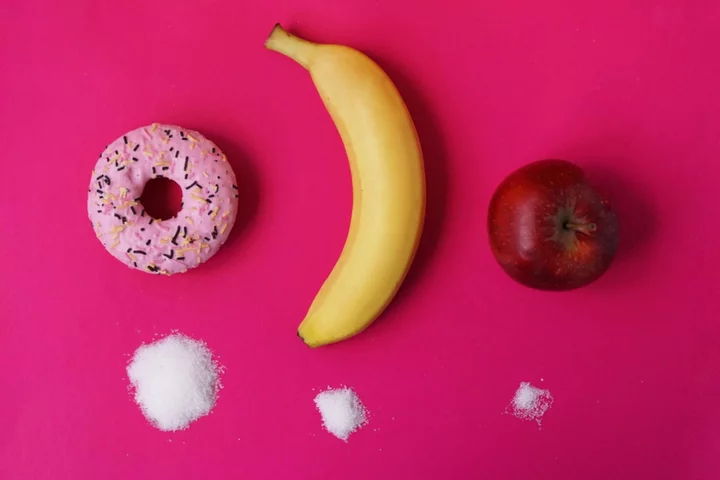
Mother diagnosed with cystic fibrosis, anorexia and incurable cancer says she ‘doesn’t feel afraid of dying any more’
A mother who was diagnosed with cystic fibrosis (CF) just days before her 30th birthday and later told she has myeloma – an incurable type of blood cancer – said she has “taught (herself) a whole new script for death” and, rather than feeling afraid, she feels “empowered” by what she has overcome. Ellie Allman, 42, who lives in Hadleigh, Suffolk, with her husband Steve, 44, a charity consultant, and son Harvey, 13, used to work as a specialist adviser for vulnerable young people but she had to retire, aged 35, after being diagnosed with CF aged 29. CF is an inherited condition that causes sticky mucus to build up in the lungs and digestive system, and while Ellie did not “feel anything initially” when she received her diagnosis, she “struggled mentally” later on and ended up developing anorexia, as she felt she had “no control over anything”. “I was off work, I was frustrated, I was angry, my body didn’t feel right CF-wise – I had no energy, I couldn’t do what I wanted,” Ellie told PA Real Life. “I was spending my days weighing everything I ate and just constantly doing the maths. “It seems ridiculous now, but it made so much sense at the time to that very determined person who was just clinging on to any form of normal life.” After becoming eligible to take Kaftrio in June 2021, a medication which significantly improves lung function, she noticed a vast improvement in her health. However, in less than a year, Ellie “randomly” became very unwell, and this led to the devastating news she has incurable cancer. After this, she underwent four months of chemotherapy alongside immunotherapy, followed by a stem cell transplant to replace the damaged blood cells with healthy ones in March 2023, and then a further two months of consolidation chemotherapy which included immunotherapy. She lost her hair, felt “exhausted” and anxious, and experienced pain “worse than labour contractions” from the “harvest of (her) stem cells” before the transplant, but she knew the pain would not last forever – and she said the support she has received from her husband, son, doctors, consultants and the charity, Ending Life’s Taboo, has been invaluable. She is now in remission and undergoing maintenance chemotherapy, and while she has experienced feelings of anger and resentment, she knows she can handle anything that her health throws at her. “I’ve taught myself a whole new script for death; I find it difficult to live with failing health, but I don’t feel afraid of dying any more,” she said. “We don’t get a choice, that’s just how it goes, but I think having the right people around you is so important. “I think it’s really natural when you’re young, or when you’re scared, to unintentionally isolate yourself or become withdrawn, and that has never ever worked for me. “I have to work hard not to lose myself within these diagnoses, and I have to remind myself that I’m still the person I was before my diagnosis.” During her childhood, Ellie developed whooping cough “in succession” – a bacterial infection of the lungs and breathing tubes – along with other chest infections and bouts of flu, but she was otherwise fit and healthy and used to run, swim, and was even a sports captain at school. She remembers certain periods of her life where she felt extremely fatigued and achy, but since her mother preferred alternative and natural medicines, Ellie rarely visited the doctor – and given she had “coughed (her) entire life”, she was “dismissive” of her symptoms. Later on, during her pregnancy, Ellie developed repeated chest infections, experienced difficulties with her speech, and could not clear her throat, but it was not until after she gave birth to her son Harvey, now 13, in 2010 that she underwent further testing. In February 2011, just days before her 30th birthday, it was confirmed she has cystic fibrosis – and, at first, she said she was “not willing to make room for CF in (her) life”. “You’ve lived your whole life not ill and then suddenly there’s this label,” Ellie said. “I didn’t feel anything initially, but I struggled with it later on, mentally.” According to the charity Cystic Fibrosis Trust, CF can be diagnosed during a new-born screening, which is carried out as part of the heel-prick test that all babies in the UK receive, but since this was only introduced nationally in 2007, this was not available for Ellie. Moreover, Ellie’s rare genotype made her CF even more difficult to diagnose. She underwent treatment in the form of intravenous (IV) antibiotics and physiotherapy sessions and noticed an improvement in her health, but when she started experiencing difficulties with her digestion – caused by a build-up of thick mucus – she started to feel “really frustrated with the world”. The side effects of the prescribed drugs also meant she could not conceive again – and while she is extremely grateful for her family, this had a “massive” impact on Ellie at the time. Ellie was then told she needed to take the medication Creon with food, which aids digestion, except for with fruits and vegetables, and this led to her developing anorexia in 2016. She said her head would “scream at her” but she could not “free (herself)” from negative thoughts that would body-shame her. “I had no control over anything, it was the perfect storm in a way; the perfect circumstances for me to use that as a control mechanism,” she said. Ellie became very weak after her “dramatic weight loss” of more than four-and-a-half stone, but after realising she needed to prioritise her health and time with her family, she underwent treatment and therapy to “reframe” her negative thoughts, so they were no longer a “dominant” force in her life. In June 2021, Ellie started taking Kaftrio, and she described it as “a miracle drug”, but approximately 11 months later, she began experiencing a “burning pain in (her) chest”. This led to the heart-breaking news in July 2022 that she has myeloma – a type of blood cancer, which is incurable – and the pain caused by treatments was unimaginable at times. She said: “Since Kaftrio thins the mucus, the high-dose chemo just ripped through the mucus in my throat, so I couldn’t swallow; the pain was insane. “My throat was blistered and ulcerated, so I couldn’t eat and I was put on to a feeding tube. “But I knew I had to get through it because if I stay in remission for two years, I could have a second transplant in future.” Ellie is now in remission and is undergoing maintenance chemotherapy, which she said “feels like a breeze in comparison”, and she is continuing to take Kaftrio, meaning the symptoms of her CF have “massively reduced” and she can enjoy the “simple things in life again”. She likes going on dog walks, meeting friends for a drink, and spending time with her “favourite people”, as that “makes everything else feel better” – and looking back now, she feels “empowered” that she has handled her CF, anorexia, cancer diagnosis, and treatments. While myeloma is incurable and Ellie has had some “existential thoughts”, she said processing what may happen in life has been “freeing” and she has always held on to hope. She has applied to become a magistrate and hopes another “miracle drug” like Kaftrio may become available during her lifetime to treat the cancer. She added: “Even in the most testing of times, every time I have found something positive to focus on or something to hope for and that has kept me going.” Ellie’s cancer is not linked to CF. To find out more information, visit: www.cysticfibrosis.org.uk/what-is-cystic-fibrosis/how-does-cystic-fibrosis-affect-the-body/cystic-fibrosis-complications/cancer Read More Dancer who has Tourette’s tics says Lewis Capaldi’s Glastonbury performance left her ‘speechless’ ‘Long Covid has taken away my ability to eat food or urinate - I don’t recognise myself anymore’ How to lower your blood sugar levels, as new research reveals heart disease link Groundbreaking cystic fibrosis drug made seven-year-old girl feel better ‘within hours’
2023-08-11 20:20

7 ways for parents and carers to ease back-to-school worries
School should be the best years of children’s lives – but, as the new term approaches, evidence suggests it’s actually the most worrying time for many kids. The children’s helpline Childline delivered 7,772 counselling sessions about school/education worries last year, with a big increase in calls in the run-up to the start of the new school year. “School is a huge part of a child’s life, so it’s important they feel happy and secure there,” says Childline director Shaun Friel. “We know some children can feel anxious and apprehensive about going back to school, particularly after spending a lot of time away from the classroom due to the summer break. “In fact, our Childline counsellors see a spike in the number of counselling sessions they deliver to children about school worries following the summer holiday season.” Friel says some children feel worried about making friends, getting lost, or the workload at a new school, while others may have concerns about returning to their current school due to friendship issues, fears about upcoming exams, or the recurrence of bullying. “However a child feels about returning to school, we want to remind them that these worries are normal and they aren’t alone,” he stresses. “If any child is feeling apprehensive about going back to school, our trained counsellors are here 24/7 over the phone and online.” As well as counselling, Friel says there are many things both parents and children can do to ease back-to-school anxieties. They include… 1. Writing feelings down Parents can get their child to write down everything they’re looking forward to at school, and everything they’re worried about. “Encourage them to show you the list so you can chat through their concerns, help them cope with their worries and also look at the positives,” suggests Friel. 2. Listening to their concerns If your child has concerns about going back to school, take time to listen to what they’re saying before you jump in to give advice or your opinion, Friel advises: “You could try repeating back what they’ve shared to check you’ve understood their feelings correctly – this will help them to feel really heard.” 3. Discussing practical solutions Once your child has shared any concerns or anxieties about going back to school, you could try talking through some practical solutions, suggest Friel. So, for example, if they’re worried about the amount of homework they’ll have, you could discuss how to break this down each evening and what they could do if they start to feel overwhelmed, like talking to their teacher or you. “You could start by asking them what they think might help them feel better about the situations that worry them,” says Friel. “This can encourage them to learn to think for themselves and feel in more control of the situation.” 4. Reminding them to take their time Remind your child it can take time to adjust to being back at school, and it’s okay if it doesn’t feel comfortable at first, says Friel. “Being back at school will mean a totally different routine, and it’s important to remember that this can take some getting used to,” he stresses. 5. Doing things they enjoy When kids are back at school, making time every day to do something they enjoy can really help to ease anxiety, says Friel. “Whether it’s time in their evening with friends, reading a book or hanging out with their siblings, it’s important to take time out,” he advises. 6. Talking to a trusted adult It’s important children are aware they can and should talk to a safe adult – perhaps a parent, carer, teacher, sibling over the age of 18 or a Childline counsellor – about anything. “No matter what the reason, if a young person is struggling ahead of going back to school, it’s vital they’re encouraged to talk to a safe adult about it,” stresses Friel. “Sharing their feelings with someone they trust will help them feel less alone with their worries, and that adult will be able to support them with this moving forward.” 7. Distracting themselves If children or young people make an effort to keep busy doing something they enjoy, such as playing football or listening to music, this could distract them from their worries, at least for a little while, says Friel. Staying connected with friends and family, whether that be online or in person, or doing some physical activity like going for a walk or taking part in a sport, can also be a good distraction technique. Young people can contact Childline, which is run by the NSPCC and supported by the People’s Postcode Lottery, on 0800 1111 or via 1-2-1 chat on Childline.org.uk Read More How to save money on your summer barbecue – as prices jump up from last year How to pick the best facial according to your age range What is the ‘carnivore diet’ trend and is it actually good for you?
2023-08-11 17:27

How to pick the best facial according to your age range
If you’re a dedicated skincare junkie, you might be thinking about how you can get that glow beyond your night-time skincare routine. Facials can be an appealing way of targeting any concerns you might have and giving your skin a bit of professional care. But they’re undoubtedly expensive, and generally more of an investment than buying a pot of moisturiser. Naturally, you want to spend your money as wisely as possible – and if you do have the extra funds for a facial, you don’t want to waste it. So, what’s the best type of facial to get for your age group? In your twenties “Facials and skincare choices in your twenties should be preventative; aiming to optimise your skin’s health and supercharging collagen and elastin levels,” says Dr Thuha Jabbar, aesthetic doctor and founder of Almas Dental. “Hydrafacials are a great, non-invasive skin boosting treatment that deep cleanse the skin, brighten and reduce fine lines. Chemical peels and other non-invasive facial treatments are also great to improve skin tone and keep breakouts at bay.” Dr Sophie Shotter is also a fan of Hydrafacials (which start from £125 depending on clinic and location – available in over 1,300 UK and Ireland providers). They provide a deep clean, followed by extracting any impurities then moisturising the skin. Shotter says they can “help to give the skin a deep clean, minimising the risk of breakouts. LED [light therapy facials] is also an excellent choice. Many facialists will combine techniques for best results.” Dr Radmila Lukian, dermatologist at the Lucia Clinic, recommends microdermabrasion for people in their twenties – a process where fine crystals and a vacuum are used to remove dead skin cells. She says it’s “a great treatment for brightening dull skin and reducing pigmentation. Perfect for young adults.” In your thirties When you hit your thirties, this is the time when Shotter recommends “starting to think about upping the ante” with your skincare. She recommends facials which incorporate microneedling – a process where small needles pierce the top layer of your skin. “We often start to notice the early signs of ageing, as collagen loss kicks in through our thirties, and these treatments can help to stimulate collagen production leading to significant improvements in skin texture,” Shotter says. Lukian recommends a facial that incorporates dermaplaning – where a scalpel removes hair and dead layers of skin – which she says can help “combat free radical damage, stimulate collagen and improve skin texture”. In your forties When you reach your 40s, Lukian suggests LED light therapy and laser skin resurfacing treatments, as they “become more relevant to target wrinkles, stimulate collagen and improve skin elasticity”. She adds: “Laser skin resurfacing uses targeted laser energy to promote collagen production – revealing healthier, younger-looking skin.” Kim Kardashian, 42, is a fan of laser facials, and often posts about her treatments on Instagram. Jabbar adds: “Your forties are a great time to try laser treatments, to reduce the visibility of wrinkles and boost the overall health and appearance of your skin. From laser skin resurfacing treatments to IPL [intense pulsed light] facials that reduce hyperpigmentation and sun spots, lasers are a versatile and non-invasive option which can restore a youthful glow to your skin.” In your fifties and beyond “In your fifties and beyond, keeping focused on collagen stimulation with similar approaches to our forties certainly helps a lot,” says Shotter. “But in our fifties, we often start to notice many more visible signs of ageing, including pigmentation and skin wrinkling (elastosis). Using deeper chemical peels or resurfacing laser techniques, which may carry a little downtime, but are worthwhile for the results.” For this age range, she says skin hydration “is also often a higher concern than in younger years”, so hydrating facials are an excellent choice too. While Hydrafacials are great in your twenties, they’re equally beneficial in your fifties and beyond – singer and actor Jennifer Lopez, 54, recently collaborated with the brand for her own ‘JLo Beauty Booster’ that can come as part of the treatment. Read More Charity boss speaks out over ‘traumatic’ encounter with royal aide Ukraine war’s heaviest fight rages in east - follow live What is the TikTok ‘carnivore diet’ trend and is it actually good for you? How to save money on your summer barbecue as prices soar Exercise and yoga can help improve lung function in adults with asthma – study
2023-08-11 16:51

What is the TikTok ‘carnivore diet’ trend and is it actually good for you?
When it comes to weird diets, TikTok is pretty notorious for spreading the word about them – and the latest iteration, the carnivore diet, is no different. The carnivore diet tag on the video-sharing platform has over a billion views, with followers of the diet dedicating themselves to meals consisting of a lot of meat (both cooked and raw), eggs and lumps of butter. With some content creators reporting immense fat loss and improved general wellbeing, how healthy is the carnivore diet? The pros “The carnivore diet, also known as the all-meat diet or zero-carb diet, is a dietary approach that involves consuming only animal products and excludes all plant-based foods,” says Dr Simon Theobalds, GP at Pall Mall Medical. Comparable to the no-carb, protein-heavy keto diet, it has the potential to boost some much-needed macronutrients, vitamins and minerals in your diet. “Red meat is a rich source of complete protein, providing all the essential amino acids the body needs for various functions, including building and repairing tissues,” says Theobalds. It can also boost iron levels: “Red meat is one of the best dietary sources of heme iron, which is more easily absorbed by the body compared to non-heme iron found in plant-based foods,” he says. “Iron is essential for transporting oxygen in the blood and supporting energy metabolism. “Red meat is also an excellent source of vitamin B12, a nutrient mainly found in animal products. Vitamin B12 is essential for nerve function, DNA synthesis, and the formation of red blood cells.” And it’s a good source of zinc, a mineral Theobalds says plays a vital role in immune function, wound healing, and cellular growth and repair.The cons So far, so good. But, where does it start to be damaging? “Red meat, particularly fatty cuts, can be high in saturated fat and cholesterol,” says Theobalds. “Consuming large amounts of saturated fat and cholesterol has been associated with an increased risk of heart disease and stroke.” Similarly, processed meats, such as bacon, sausages, hot dogs, and deli meats, have been classified as Group 1 carcinogens by the International Agency for Research on Cancer (IARC). “This means there is strong evidence linking processed meat consumption to an increased risk of cancer,” he adds. It could also mean when you get sick, it’s harder to get well again, as it may encourage antibiotic resistance. “In many countries, livestock may be treated with antibiotics to promote growth or prevent disease,” Theobalds notes. “The overuse of antibiotics in meat production can contribute to antibiotic resistance, making it harder to treat bacterial infections in humans.” Despite the nutrients you can get from animal products, this diet could still lead to certain deficiencies. “Meat lacks essential nutrients found in plant-based foods, such as dietary fibre, certain vitamins like vitamin C, and minerals such as potassium. Long-term consumption of only meat can lead to nutrient deficiencies and related health problems,” he adds. A varied diet will also promote a healthier gut. “Aiming to incorporate 30 different plants into your diet each week is a great goal to have in mind,” says Anna Tebbs, registered nutritionist and head chef at Green Chef. “Having a range of plants in your diet will ensure you are fuelling the different gut microbiomes in your body. A plant-based diet tends to be higher in prebiotics, which gives the good bacteria in your gut extra fuel, and has an anti-inflammatory effect.” Is it worth it? With so many people posting about and adopting this diet, is it worth the risks for the benefits it promises? “While consuming meat can provide important nutrients, relying solely on a diet of meat and excluding other food groups may pose several risks,” says Theobalds. “A balanced diet provides essential nutrients, supports overall health, and reduces the risk of nutritional deficiencies and associated health problems. Before making any significant dietary changes, especially one as restrictive as an all-meat diet, it’s essential to consult with a registered dietitian or healthcare professional. They can help assess your nutritional needs, provide personalised guidance, and help you develop a balanced and sustainable eating plan that aligns with your health goals. Read More Charity boss speaks out over ‘traumatic’ encounter with royal aide Ukraine war’s heaviest fight rages in east - follow live How to save money on your summer barbecue as prices soar Exercise and yoga can help improve lung function in adults with asthma – study 7 ways to ease back-to-school worries
2023-08-11 16:50

Exercise and yoga can help improve lung function in adults with asthma – study
Yoga and breathing control, in combination with aerobic training, can help improve lung function in adults with asthma, a new study suggests. The findings highlight the importance of integrating appropriate exercise training into asthma management plans, researchers say. The study indicates how specific types of exercise training can be effective in enhancing lung function for adults with the condition. Lead author Shuangtao Xing, an associate professor at the School of Physical Education at Henan Normal University in China, said: “Breathing training combined with aerobic training, and yoga training, appear to be particularly advantageous – offering potential avenues for effective treatment approaches. These findings should provide valuable insight for healthcare professionals prescribing exercise training for the management of adult asthma patients Shuangtao Xing, Henan Normal University “Larger, well-designed randomised controlled trials are now needed to more accurately estimate the benefits of exercise training for individuals with asthma. “These findings should provide valuable insight for healthcare professionals prescribing exercise training for the management of adult asthma patients. “However, it is essential to consider individual factors, such as family history, duration of the condition, and environmental influences, when designing exercise rehabilitation programmes. “Tailoring interventions to individual physical and mental health conditions, with careful consideration of exercise intensity, frequency and duration, is important for optimising treatment outcomes.” Asthma is a chronic lung condition that affects around 339 million people worldwide, causing symptoms such as coughing, wheezing, shortness of breath and chest tightness. The National Institute for Health and Care Excellence (Nice) states that in the UK, more than eight million people, or approximately 12% of the population, have been diagnosed with asthma. However, some may have grown out of the condition, and around 5.4 million people are receiving asthma treatment. In the past, exercise was considered a potential risk factor for people with the condition, as it was believed to trigger or worsen acute asthma attacks. However, recent studies have revealed that exercise training can actually enhance lung function and exercise capacity in adult patients. To address challenges posed by variations in the specific exercises featured in research, researchers compared results from multiple treatments across 28 studies, including 2,155 patients. They examined the effects of breathing training, aerobic training – which increases the rate at which oxygen inhaled is passed on from the lungs and heart to the bloodstream – relaxation training, yoga training, and breathing combined with aerobic training, on lung function. All five types of exercise demonstrated greater effectiveness in improving lung function, the study found. Specifically, the researchers found that breathing training, aerobic training, relaxation training, yoga training, and breathing combined with aerobic training, led to improvements in the amount of air that a person could force out of their lungs in one second (FEV1), and the levels of air flowing out of the lungs (PEF). Aerobic training, breathing training, yoga training and breathing combined with aerobic training, improved the level of the amount of air that could be forcibly exhaled from the lungs after the deepest breath possible was taken (FVC). Breathing training, aerobic training and yoga training improved the FEV1/FVC ratio, the study published in the Annals of Medicine journal found. The researchers highlight that the majority of patients in the study were under 60 years of age, so exercise interventions may yield different responses in older people. Read More Charity boss speaks out over ‘traumatic’ encounter with royal aide Ukraine war’s heaviest fight rages in east - follow live 7 ways to ease back-to-school worries What is the best type of facial for your age range? King Charles reshuffles military roles with new duties for William and Kate
2023-08-11 15:55

7 ways to ease back-to-school worries
School should be the best years of children’s lives – but, as the new term approaches, evidence suggests it’s actually the most worrying time for many kids. The children’s helpline Childline delivered 7,772 counselling sessions about school/education worries last year, with a big increase in calls in the run-up to the start of the new school year. “School is a huge part of a child’s life, so it’s important they feel happy and secure there,” says Childline director Shaun Friel. “We know some children can feel anxious and apprehensive about going back to school, particularly after spending a lot of time away from the classroom due to the summer break. “In fact, our Childline counsellors see a spike in the number of counselling sessions they deliver to children about school worries following the summer holiday season.” Friel says some children feel worried about making friends, getting lost, or the workload at a new school, while others may have concerns about returning to their current school due to friendship issues, fears about upcoming exams, or the recurrence of bullying. “However a child feels about returning to school, we want to remind them that these worries are normal and they aren’t alone,” he stresses. “If any child is feeling apprehensive about going back to school, our trained counsellors are here 24/7 over the phone and online.” As well as counselling, Friel says there are many things both parents and children can do to ease back-to-school anxieties. They include… 1. Writing feelings down Parents can get their child to write down everything they’re looking forward to at school, and everything they’re worried about. “Encourage them to show you the list so you can chat through their concerns, help them cope with their worries and also look at the positives,” suggests Friel. 2. Listening to their concerns If your child has concerns about going back to school, take time to listen to what they’re saying before you jump in to give advice or your opinion, Friel advises: “You could try repeating back what they’ve shared to check you’ve understood their feelings correctly – this will help them to feel really heard.” 3. Discussing practical solutions Once your child has shared any concerns or anxieties about going back to school, you could try talking through some practical solutions, suggest Friel. So, for example, if they’re worried about the amount of homework they’ll have, you could discuss how to break this down each evening and what they could do if they start to feel overwhelmed, like talking to their teacher or you. “You could start by asking them what they think might help them feel better about the situations that worry them,” says Friel. “This can encourage them to learn to think for themselves and feel in more control of the situation.” 4. Reminding them to take their time Remind your child it can take time to adjust to being back at school, and it’s okay if it doesn’t feel comfortable at first, says Friel. “Being back at school will mean a totally different routine, and it’s important to remember that this can take some getting used to,” he stresses. 5. Doing things they enjoy When kids are back at school, making time every day to do something they enjoy can really help to ease anxiety, says Friel. “Whether it’s time in their evening with friends, reading a book or hanging out with their siblings, it’s important to take time out,” he advises. 6. Talking to a trusted adult It’s important children are aware they can and should talk to a safe adult – perhaps a parent, carer, teacher, sibling over the age of 18 or a Childline counsellor – about anything. “No matter what the reason, if a young person is struggling ahead of going back to school, it’s vital they’re encouraged to talk to a safe adult about it,” stresses Friel. “Sharing their feelings with someone they trust will help them feel less alone with their worries, and that adult will be able to support them with this moving forward.” 7. Distracting themselves If children or young people make an effort to keep busy doing something they enjoy, such as playing football or listening to music, this could distract them from their worries, at least for a little while, says Friel. Staying connected with friends and family, whether that be online or in person, or doing some physical activity like going for a walk or taking part in a sport, can also be a good distraction technique. Young people can contact Childline, which is run by the NSPCC and supported by the People’s Postcode Lottery, on 0800 1111 or via 1-2-1 chat on Childline.org.uk Read More Charity boss speaks out over ‘traumatic’ encounter with royal aide Ukraine war’s heaviest fight rages in east - follow live What is the best type of facial for your age range? King Charles reshuffles military roles with new duties for William and Kate Government urged to remove VAT from period pants
2023-08-11 15:46

How to lower your blood sugar levels, as new research reveals heart disease link
Raised blood sugar levels could be linked to a greater risk of heart diseases, a new study suggests. Research from the London School of Hygiene and Tropical Medicine found that men and women with raised blood sugar levels have a 30-50% increased chance of developing cardiovascular diseases (CVDs) even when these levels are below the threshold for diabetes. Highlighting the importance of diet and lifestyle factors, the study also found that for blood sugar levels within the normal range, those with the lowest levels had a 10% lower risk of developing any form of CVD, which includes heart attacks and strokes. What are blood sugar levels? “Blood sugar levels, also known as blood glucose levels, are a measurement that shows how much glucose you have in your blood,” says Dr Gill Jenkins, GP, and advisor to the Tea Advisory Panel. “Glucose is a sugar that you get either directly from food and drink, through digestion of carbohydrate-containing foods, or through other metabolic processes in the body.” Blood sugar levels fluctuate throughout the day, she explains: “Increasing with eating and drinking (including alcohol), falling if you haven’t eaten or drunk for some time.” The energy spike and subsequent slump you get from a fizzy drink or sweet snack is explained by the rise and fall of blood sugar. “Blood glucose levels can also change with exercise, state of hydration, and with physical or mental stress, and certain medications,” Jenkins says. “Even in people without diabetes, major illnesses, hormonal disorders, or certain medications such as steroids and some antidepressants, can cause blood sugar fluctuations.” How can you tell if your blood sugar is raised? Getting a sudden energy boost from a sugary food or drink isn’t actually a symptom of high blood sugar, also known as hyperglycaemia. “Symptoms of very high blood sugar usually come on gradually and include feeling very thirsty, peeing a lot, blurred vision, feeling weak or tired and unintentionally losing weight,” Jenkins says. “However, you may have no symptoms – or may not notice them – running constantly raised sugar levels.” How to lower your blood sugar levels Diet, exercise and other lifestyle factors can all impact your blood sugar levels. “In general, avoid eating too much sugary or starchy food – and that includes sugary drinks, as well as alcohol,” says Jenkins. “Focus as much as possible on unprocessed grains, such as oats, mixing in a few seeds or nuts.” Getting your five-a-day fruit and vegetables also helps: “Especially green leafy varieties such as kale, broccoli, spinach, cavolo nero.” Fruits such as strawberries, raspberries and blueberries are excellent, but be careful with ripe tropical varieties: “Limit fruit which may, depending on the individual, produce a higher glycaemic response, such as mango, banana, pineapple, melon.” Stay hydrated with water or other low-sugar beverages, such as tea, which has been shown to normalise blood sugar levels following a meal. “The reason for these findings are related to the polyphenol content of black tea, which help to regulate blood glucose and insulin,” says Jenkins. Aim for the NHS-recommended 150-minutes of exercise a week, combining moderate movement – such as walking – with intense activity, if your fitness allows. “Walking alone reduces weight – if you also pay attention to diet – and improves insulin sensitivity, which helps to control blood glucose,” Jenkins says. “Even if you don’t ‘exercise’, being more active will help – take the stairs rather than the escalator, park your car a little further from work, get off the bus one stop early and then walk.” A study last year found that even standing up as much as possible throughout the day can significantly reduce your blood sugar levels. Lastly, check with your GP if you have other illnesses, advises Jenkins. “If you have diabetes, take your diabetes medication exactly as prescribed and follow any recommendations your diabetes nurse, doctor or health care team gives you.” Read More Charity boss speaks out over ‘traumatic’ encounter with royal aide Ukraine war’s heaviest fight rages in east - follow live Remove VAT from period pants, government urged ‘Long Covid has taken away my ability to eat food or urinate in three years’ 11 ways to max up your monochrome scheme
2023-08-10 20:53

Dancer who has Tourette’s tics says Lewis Capaldi’s Glastonbury performance left her ‘speechless’
A dance teacher diagnosed with Tourette’s syndrome – meaning she has unpredictable tics where she whistles, blinks and sometimes swears – has said watching Lewis Capaldi’s “beautiful” Glastonbury performance left her “speechless” and she wants to raise awareness of the incurable condition so others do not feel “lost or alone”. Bryony Munro, 24, a dance teacher who lives in Scotland, started experiencing symptoms of Tourette’s syndrome – a condition which causes a person to make involuntary sounds and movements called tics – when she was 12 as she started to spontaneously hiccup. However, it was not until her early 20s, in summer 2021 – when her limbs started “jerking all the time” and she developed other tics, such as whistling, clearing her throat and blinking – that she received an official diagnosis, which she described as “bittersweet”. “I was very happy to have that definition, but then knowing what comes with that was very daunting and scary; I was terrified,” Bryony told PA Real Life. In the years leading up to her diagnosis, Bryony said people would stare at her in public, whisper, and talk behind her back, saying “She’s making it up” or “She’s faking it” – and this made her realise that “people are very misinformed of what Tourette’s is”. “People treated me differently because they didn’t believe I was telling the truth and they tried to tear me down,” she said. “I wish they would have just asked me questions rather than making up rumours behind my back that aren’t true.” Bryony has since set up her own Instagram and TikTok accounts to address the most common misconceptions about Tourette’s, as she wants to raise awareness of the condition, but the “outlets” that have helped her through her darkest times are music, singing and dancing. She said performing in front of an audience can be “terrifying” when you have Tourette’s, but she believes Capaldi’s moving performance at Glastonbury, where he appeared to struggle with an increasing number of tics while singing his hit song Someone You Loved, will help to change the way the condition is perceived. “It was almost like an out-of-body experience because I just put myself in his shoes,” she said. “My heart broke – not in a bad way – but seeing the amount of love he received from his fans left me speechless, it was just beautiful, and having so many people watch that live or online just brings so much awareness and takes the pressure off the Tourette’s community because they are beginning to see what it’s really like for people with the condition.” Tourette’s syndrome is a condition that causes a person to make involuntary sounds and movements called tics, and there is no cure, the NHS says. Tics are not usually harmful to overall health, but physical manifestations, such as jerking of the head, can be painful, and may be worse during periods of stress or anxiety. Bryony’s first tic came in the form of a hiccup or “inhale of breath”, which did not affect her daily life at the time, but her symptoms progressively worsened. Her tics became debilitating during the Covid pandemic, which led to her diagnosis in 2021, but her lack of knowledge about the condition initially left her feeling “terrified”. Her other diagnoses of obsessive-compulsive disorder (OCD), anxiety, depression and functional neurological disorder (FND) – which affects how the brain receives and sends information to the rest of the body and can cause Bryony to have absence seizures – added to her concerns as she feared she would have a “constant battle with her mind and body”. “I think seeing how it was presented on TV and in the media, and initially having my own misconceptions about Tourette’s, made me feel terrified to have to live with it,” she said. “Tics can be very damaging as there are very aggressive tics that can make you kick, punch, jump and literally jump out into oncoming traffic, which is terrifying. “When my tics first started getting worse, I had this punching tick where I punched a wall, but some of my other tics, like my toes wrinkling, are not visible to others. “I was very much in the dark to begin with, but doing research and reaching out to people was probably the best thing I could have done.” While Bryony’s tics have not put her in any life-threatening situations, she said daily tasks, such as brushing her teeth or doing her make-up, can be challenging and time-consuming. She cannot drive and, on days when her tics are particularly bad, she cannot cook, style her hair with straighteners or curlers, or use the kettle, as she could hurt herself. “It’s so unpredictable and, right now, I’m not able to go anywhere on my own just in case I do have an episode where I might hurt myself,” she explained. Bryony has “tools” to manage her Tourette’s, such as using stress toys to “keep (her) hands busy”, but she said she does not know where she would be without music, singing and dancing. She teaches dance to pupils ranging from two-and-a-half years old to 30, and said focusing on something else “helps (her) tics melt away for a little while”. She is training her golden retriever puppy Nala, whose name was inspired by Disney’s The Lion King, to become an assistance dog so she can “live a more normal life” in the future. “Having that independence back again from taking Nala into work, to do shopping, maybe to go to the gym, it will be so relieving; the pressure will be enormously decreased,” she said. “Even the social anxiety of being out of the house, having her with me will just be so good for me.” Bryony, who lives with her “incredibly supportive” fiance Matthew, 31, a chef, wants to continue raising awareness of Tourette’s, and is even more inspired to educate others after Capaldi’s performance at Glastonbury in June, as she has seen the “love” he has received and does not want anyone to feel “lost or alone”. “Knowing he had the support of every single person there; I couldn’t imagine the amount of love that he must have felt,” she said. “I felt it through watching it through my phone, I fully felt all of that.” She added: “You never know anyone’s full story or full life story, so accepting people for who they are, and accepting yourself for who you are, is probably the best advice I can give. “Also, just be kind because you have no idea what anyone is going through.” You can follow Bryony on Instagram or TikTok @brydoeslife Read More ‘Long Covid has taken away my ability to eat food or urinate in three years’ Grimes says her and Elon Musk’s three-year-old child X ‘knows a lot about rockets’ How many steps a day can cut risk of early death (and it’s not 10,000) ‘Long Covid has taken away my ability to eat food or urinate in three years’ Grimes says her and Elon Musk’s three-year-old child X ‘knows a lot about rockets’ How many steps a day can cut risk of early death (and it’s not 10,000)
2023-08-10 20:28

‘Long Covid has taken away my ability to eat food or urinate - I don’t recognise myself anymore’
A young woman whose health “deteriorated rapidly” after being diagnosed with long Covid and suffering a liver bleed is now in a wheelchair, feeds herself through a tube in her chest and has been unable to urinate in three years. Abigail Snowball, 29, was told she suffered from a rare condition known as Fowler’s Syndrome a few months after she was diagnosed with long Covid in July 2020 and her bladder stopped working. The social worker, from Northumberland, says she was “never sick” and enjoyed long runs before testing positive for coronavirus in early 2020 and feeling a sharp pain under her ribs which scans showed was a bleed on her liver. Abigail had not fully recovered from the virus and since the diagnosis, her health has gone from bad to worse, to the point where she has not been able to urinate in three years. She now depends on her husband Mark, 34, to carry her to the bathroom so she can empty her bladder, which can take up to four hours, and has not been able to enjoy a mouthful of food for nearly a year. “I had never really been ill before,” Abigail told PA Real Life. “As a child, I was always really lucky and never poorly. I look back at pictures from before Covid and I don’t even recognise myself.” Abigail had completed a 20-mile race, the Run Northumberland BIG 20, just a week before testing positive for Covid and having to quarantine away from Mark, who works in maintenance for Nissan. “It was very much at the start of the pandemic, back at the time when there weren’t any vaccines or much testing,” she said. “It was just tiredness like I’ve never felt before in my entire life. I remember having a cup of tea and struggling to lift the mug up.” Like many other people’s experience of catching Covid, Abigail’s health improved over the next 10 days. “I did get better, but I never fully recovered,” she said. But a couple of months later, while visiting her parents, Jane and Ray Cresswell, in Cornwall on holiday, she suddenly began feeling a sharp pain under her ribs. “It was a really strange location to have pain,” she added. She visited the GP a week later and was admitted to Northumbria Specialist Emergency Care Hospital (NSECH) in July 2020, where scans revealed Abigail had suffered a bleed on her liver. “That’s when they diagnosed me with long Covid,” she said. “There was no other explanation, because they tested for blood disorders and carried out a scan. “They asked me if I had a fall or accident, but there was literally nothing.” Abigail was recovering from her liver bleed in hospital late one evening when a nurse asked when the last time she urinated was. “I actually thought, ‘god, it wasn’t since this morning’,” she said. “From that point, my bladder never regained any function. That was really the start of my health declining quickly.” Doctors hoped her bladder block was simply a result of the liver “trauma” and that she would be on the mend soon. But, sadly, this was not the case. A few months later, Abigail was diagnosed with a rare condition called Fowler’s Syndrome, which causes women to have problems passing urine. Abigail’s condition has deteriorated over the past few weeks and she is now losing weight rapidly. “I am now sleeping on the sofa downstairs and my husband Mark is having to carry me to the toilet and back again,” she said. “We can spend up to four hours at a time trying to drain my bladder, and the pain is just unbearable. “I went from running 20 miles to using a wheelchair. You don’t realise how inaccessible the world is until you are in that position.” Since the diagnosis, Abigail has spent more than 350 days in hospital and undergone 12 surgeries, including one in October 2021 to try and reconstruct her bladder. To make matters worse, she developed intestinal failure last year, which means she can no longer eat food. “I haven’t eaten anything in a year now,” she said. Instead, she is fed through TPN (total parenteral nutrition), a tube in her chest which delivers nutrients directly into the blood stream. Abigail and Mark, who married earlier this year in May, both received close to six months of training on how to perform the feeding procedure given there is a high risk of infection. “We had never even heard of that – being fed through a line into your heart,” she said. Abigail has been told by doctors that her liver bleed was “extremely likely” to have been caused by Covid. While Covid is known to harm the lungs, it has also been found to affect other organs, including the heart, liver and kidneys, but wider research is needed to better understand its long-term effects. Liver problems are common among patients with Covid-19, according to a study carried out by researchers at Oxford University and published in the peer-reviewed journal Hepatology Communications. Abigail, whose condition is considered “severe”, is hoping to receive specialist treatment in London, known as bladder Botox, which involves injecting Botox into the bladder every three to nine months, but there is no guarantee this will work. “Because of how severe and complex my case is, we’ve exhausted all our options here and the doctors are saying that I need to see the specialists in London,” she said. “Removing my bladder completely remains on the cards, but it’s incredibly high risk because of my intestinal problems. “There is no cure for Fowler’s, so it’s about managing it in the best way possible.” The combination of health conditions has left Abigail unable to perform everyday tasks. “It’s funny because the things I want to be able to do are so normal,” she said. “Just being able to wake up, take the dog for a walk and go to work. “Things that in the past, I completely took for granted.” To help cover the costs, Abigail’s friend Emma Holt has set up a GoFundMe which has received thousands of pounds in donations. “We never imagined in our wildest dreams that we would raise the amount of money that we have already,” she said. “It’s the one thing that really keeps us going, when things are really difficult. “Knowing that we have so many people behind us and supporting us is amazing.” Fowler’s Syndrome is most often caused by infection or following surgery or trauma, but a link to long Covid has yet to be established and more research is needed. Dani Coombe, CEO, Fowler’s Syndrome UK said: “It’s too early to say if long Covid is a trigger for Fowler’s syndrome; we haven’t seen an increase in Fowler’s and retention post-Covid yet, and there is no indicator that urinary retention gets worse. “Our research into what patients believe triggered their urinary retention shows that infection is the most common trigger at 57 per cent, followed by surgery in 32 per cent of patients and trauma at 19 per cent. “It would be noteworthy to see in coming years if there is an increase in women with Fowler’s because of the trauma of Covid-19.” Read More Fake meat is dying, but that shouldn’t mean the end of veganism What I gained (and lost) from walking 10,000 steps a day for five months Woman behind ‘not real’ plane tirade identified as marketing executive with $2m home Charity boss speaks out over ‘traumatic’ encounter with royal aide Ukraine war’s heaviest fight rages in east - follow live
2023-08-10 18:52

6 survival tips for parents of live-at-home university students
A fifth of new students plan to live at home while studying at university, according to new research. But while living with their parents will undoubtedly be cheaper, it could create problems if teenagers try to live a typical student lifestyle in their mum and dad’s house – so experts advise ground rules. A new UCL and Sutton Trust study of more than 11,000 Year 13 students in England, who have either applied or plan to apply to university, found 20% had decided to live at home during term time if they got into university (14% had not yet decided). Nearly a fifth (18%) said the main reason was because they couldn’t afford to live away from home, while 46% said they wanted to be near their families. Gill Hines, co-author of Later! A Guide to Parenting a Young Adult (Piatkus), says living at home while doing further education is an increasing trend. “There’s many, many more kids living at home when they go to university – universities are reporting a lot more students are local people. But there can be problems, particularly with the social side of things,” she says. To help life with an adult student living at home remain as harmonious as possible, Hines says it’s vital for students and parents to discuss exactly what the house rules are well before term starts. “Sit down with them and talk about how things are going to be once they start uni,” she advises. “You need to talk to them about everything their new life may entail, including overnight guests, finances, and them behaving like adults so you can treat them like adults.” Here, Hines outlines the issues that need to be addressed in families where teenage students choose to live at home… 1. Set rules for helping in the houseParents need to talk to their teenager about how they’re going to contribute to the running of the home, stresses Hines. “They need to be doing much, much more than they probably have been doing. If they want the rights of being a young adult, they have to do the work of a young adult. Rights and privileges are great, but there are responsibilities too.” It’s important to be clear about what’s expected of them, which should include a high level of self-care (you probably don’t want your house to smell like student digs). They may be expected to buy and make their own food, and if so, clear up after themselves, do their own laundry – or take a turn in doing the household laundry – take their turn to clean the bathroom, put the bins out, etc. “You could either have set chores, or say that every fourth week or whatever they do a particular chore, whatever seems fair. It all needs to be discussed with them,” she says, although “they won’t like it”. Adding: “We want them to have a nice life at university, but they do need to knuckle down. Hopefully they’ll be moving out [in the future], and they need to be able to look after themselves.”2. Discuss overnight guests Parents may already have had ‘the talk’ about girlfriends or boyfriends staying overnight and what’s acceptable, but if not, now is the time to do it, says Hines. “They’re more likely to have a partner or be in a sexual relationship at this age, and may be playing around because they’re at that stage of life. Parents need to have a chat with their child about it, and also with each other about how comfortable they are with overnight guests, and some rules need to be outlined.” She suggests that, if possible, it may help to move their bedroom closer to an outside door, so they can come and go with more freedom. “I know it’s not possible for everybody,” she notes, “but if you can change an upstairs room to one downstairs for them, it might help them to not have to trail right through the house with their guests, and they’ll have a sense of being more independent.” 3. Don’t treat them like a child Hines says it can be tempting for parents whose young people live at home to treat them like children, but treat them as adults and they’re more likely to behave like one. “They’re that bit older, and they no longer get the right to be a child who’s looked after 24/7,” she stresses. Getting themselves up, getting themselves to uni, and getting their work done on time is not the parents’ responsibility anymore. “You need to be clear about that,” she stresses. “The whole point of university is for them to grow up. It’s all down to them now – you’re no longer responsible for their day-to-day life – they are.” 4. Explain what you’ll do if they break your rules Hines points out that although parents of adult children don’t have many sanctions if their house rules aren’t followed (they’re too old to be grounded) be aware of what you pay for. “If you pay for their phone and their travel and food or anything else, they need to accept that not every parent is doing that for their child at the age of 18,” she says. “It’s not a right, it’s a privilege, and some of it can be taken away.” 5. Encourage them to get a job Hines points out that many students living away from home while at university have to get a part-time job to make ends meet, and says: “I would encourage them to get an income – as well as needing the money, it’s good experience.” 6. Discuss finances Although once teens are earning, some parents may expect a contribution to room and board, Hines says if they’re students with a part-time job it might not be a feasible request. “I don’t think they should be contributing to the financial running of the home – at that age, I think it’s unrealistic to expect them to – but I think they should be contributing in other ways, like helping around the house.”
2023-08-10 13:59

Woman says she was told not to breastfeed on flight because it would make passengers ‘uncomfortable’
People are coming to a woman’s defence after she claimed that she was told not to breastfeed on a plane because it would make other travellers “uncomfortable”. Chelsea Williams took to Facebook on 7 August to describe what she says was her experience with TUI Airways, a British airline owned by the TUI Group. She claimed that while she was in her seat during a recent flight and breastfeeding her child, one of the plane’s crew members told her to stop. “During our outbound flight I was told I was not allowed to breastfeed (even though we were both buckled) during takeoff and landing,” she wrote. “I have never had this with other airlines, in fact, it is encouraged to help with baby ear pain!” She then claimed that, after the experience, she was encouraged to reach out to TUI about its travelling regulations. “Before my inbound flight, I thought I’d check what the official rules were as I was shocked it wasn’t allowed as it left my baby screaming as a consequence,” she wrote. William’s post went on to include the message that her husband, Thomas, sent to TUI, asking if his partner could breastfeed their five-week-old baby while their plane is taking off and landing. According to the screenshot of the message, TUI then responded by encouraging Thomas’ wife to avoid breastfeeding on the plane, for the sake of other passengers. “There are no official restrictions, however, we would not recommend it because it could make other people uncomfortable,” the message read. Williams also added that the response from TUI was “complete discrimination and majorly disappointing”. Speaking to The Independent, Williams said that while on her first flight with TUI, the airline employee tried to “disguise the airline’s discrimination with the guise of a ‘safety issue’ but later retracted that”. “The cabin crew member said: ‘You’ll need to stop feeding as it is not permitted on takeoff and landing,’” she explained. “She then said my five-week old had to forward face, I said that she doesn’t have sufficient neck support at that age, which was answered with: ‘Maybe you could just sit her against you facing forward and lean back a bit.’” She also specified that, despite what TUI had allegedly told her husband in its message, she was able to breastfeed her daughter on her flight back home. Her Facebook post has since gone viral, with more than 1,200 reactions. In the comments, many people have gone on to defend Williams while criticising TUI for its “damaging” message about mothers breastfeeding in public. “Oh TUI - it’s damaging comments like this that can deter women from breastfeeding or breastfeeding in public,” one person wrote. “What’s so offensive about feeding a baby and if people are uncomfortable about a baby feeding in the most natural way by milk that is designed for HUMANS then that is their issue not hers or her baby’s fault.” “If other people are allowed to eat and drink in public then why is breastfeeding our children not allowed. What a disgusting response!!!” another added. “To all the breastfeeding moms out there, keep going. We’ve got this. Screw what other people say and think. Just smile at them and carry on, that will make them uncomfortable!” “This is absolutely disgraceful!!” a third wrote. “I am flying with TUI next month and have every intention of breastfeeding during take off and landing whether anyone feels ‘uncomfortable’ or not!” TUI has since responded to the comments on Williams’ post, with the company stating that it is “aware of the situation and are conducting an internal investigation”. TUI also added that “breastfeeding is permitted” on its flights, while the company “advises against it during takeoff and landing for safety reasons”. According to the Centers for Disease Control and Prevention, mothers are encouraged to breastfeed their children “during takeoff and landing when travelling by airplane,” as “this will help to protect your child from ear pain due to cabin pressure changes”. The health agency also encourages mothers to feed their children “on demand,” noting that the best way for them to “maintain [their] milk supply is to breastfeed whenever [their] baby is hungry”. Speaking to Metro, Williams opened up about the breastfeeding incident during her first TUI Airways flight, which was from England to Spain. She said that after she stopped breastfeeding, after the airline employee had asked her to do so, her “baby was obviously crying”. “Quite drastically because I had cut her feed while she was in the middle of it - and the toddler was crying,” she added, referring to her two-year-old child. “I was sweating, I was on the verge of tears. I felt like everyone’s eyes were on us because obviously the baby was screaming and I obviously looked not great at that moment. The baby’s cries were getting worse – she was obviously in pain, she was obviously hungry as well.” Williams said that she waited until the seatbelt lights went off to start feeding her baby again. In a statement toThe Independent, TUI said: “We are really sorry for the distress caused to Ms Williams and her infant. As a family friendly travel company we support breastfeeding on our flights at any time. We will be making sure that all colleagues are retrained on our breastfeeding friendly policy.” Williams told The Independent that she “had a call with TUI” and talked to the company about some of the changes she hopes to see implemented. “They did sound receptive to some of the points raised, I will continue to push them to ensure these changes are made,” she said. Read More Breastfeeding Olympians want it all: Top careers and motherhood Ireland Baldwin reveals why she did not want to breastfeed her daughter after giving birth Couple flies abroad for day trip after they find flights are cheaper than train to London Americans spark backlash after claiming that Europeans ‘don’t believe in water’ Grimes says her and Elon Musk’s three-year-old child X ‘knows a lot about rockets’ What is TikTok’s ‘soft life era’ and could it be the secret to happiness?
2023-08-10 06:53

Grimes says her and Elon Musk’s three-year-old child X ‘knows a lot about rockets’
Grimes has opened up about raising her children with ex, Elon Musk, with the musician revealing that their three-year-old son “knows a lot about rockets”. The singer, 35, spoke candidly about co-parenting with the Tesla CEO during her cover story interview with Wired, published on 8 August. Along with their three-year-old, X Æ A-12 - who goes by “X” - the former couple shares a one-year-old daughter, Exa Dark Sideræl, who goes by “Y”. While speaking to Wired, Grimes was asked about Musk’s “weird kind of protégé thing going on” with their son, as he’s taken him to “meetings” and work events before. However, Grimes said that she’s “here for that” relationship between the father and son, before explaining that they share common interests. “X knows a lot about rockets,” she said. “It’s crazy. He knows more about rockets than me.” She then specified that she and Musk have stopped giving X toys, since he “gets upset” if “they’re not anatomically correct”. However, the singer confessed that she’s been a little worried about her son’s interest in space, as she described his reaction to the Starship rocket exploding earlier this year. “He’s a little engineer, for sure. But his obsession with space is bordering on: ‘Is this healthy?’ When X saw Starship blow up, he had, like, a three-day PTSD meltdown,” Grimes recalled. “Every hour, he was waking up and going: ‘Starship …’ and I had to rub his back.” Grimes - who announced her split from Musk in 2022- shared that her daughter is “a little engineer too,” explaining: “She likes industrial shipping. She’s very strange.” As she continued to open up about co-parenting with her ex, she said that she’s “trying to find a great peer group,” or “other parents who are sort of like us and share similar values”. She went on to speak candidly about the different boundaries she wants to set as a parent. “I really care about having a very good relationship with my kids. I think I understand how to be a good parent to them,” she said. “Both enforcing discipline and being their friend. Who knows, maybe they’ll resent me and reject family culture, but I feel like they will not.” She also confessed that she’s “a little bit” worried about her children’s privilege, as their father holds the title as the richest person in the world. “I think their life is gonna be pretty intense,” she said. “Being Elon’s kid is not the same as being anyone’s kid. In my house, at least, I want it to be more of a crazy warehouse situation and a cool art space.” Grimes and Musk first met in 2018 when he direct messaged her on social media, where they then made the same pun about artificial intelligence. In September 2021, Musk revealed to Page Six that he and Grimes have “semi-separated” due to conflicting schedules and locations. Two months later, the pair welcomed their daughter together via surrogate. After the announcement made headlines, Grimes told Vanity Fair in March 2022 that she and Musk have a fluid, inexplicable partnership. However, she later made a clarification about the comment on Twitter, noting that while she and Musk had broken up since welcoming their daughter, “he’s my best friend and the love of my life”. Elsewhere in her interview with Wired, Grimes acknowledged that she’s learned a lot from her ex, specifically when it comes to leadership skills. “I learned from him, like, the best internship ever. People don’t like talking about Elon, but it was incredible to be right there watching all that SpaceX stuff happen,” she said. “That’s a master class in leadership and engineering and makes you understand how rare it is to have a leader of that quality.” Grimes continued to praise Musk’s management skills, adding: “Elon has an old-world kind of discipline I really respect. And I think it rubs a lot of people the wrong way. They don’t want to be in that hardcore zone. If you’re not consenting to being in that hardcore zone, I get it.” She also specified that Musk has “challenged” her a lot, and taught her about running her own company and team. When asked what her ex learned from her, she said that she’s helped him “have more fun”. “I try to soften him up, to build family culture,” she said. “And he steals a lot of my memes.” Read More Elon Musk gave Grimes a ‘trivia test’ on Lord of the Rings when they first started dating Grimes criticised for remarks about Lizzo accusers Grimes weighs in on alleged cage match between Elon Musk and Mark Zuckerberg Elon Musk gave Grimes a ‘trivia test’ on Lord of the Rings when they started dating Grimes weighs in on alleged cage match between Elon Musk and Mark Zuckerberg Mark Zuckerberg reveals his 4,000 calorie diet and large McDonald’s order
2023-08-10 06:28
